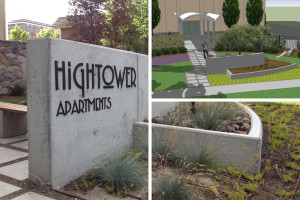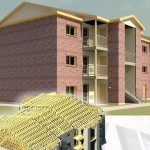 In an increasingly urbanized world, the importance of greenspaces and landscape architecture in fostering mental health and well-being cannot be overstated. As individuals spend more time in concrete jungles, the connection to nature becomes essential for their physical, emotional, and psychological health. In this blog post, we will explore the profound impact of landscape architecture on mental well-being, highlighting its role in transforming spaces into havens.
In an increasingly urbanized world, the importance of greenspaces and landscape architecture in fostering mental health and well-being cannot be overstated. As individuals spend more time in concrete jungles, the connection to nature becomes essential for their physical, emotional, and psychological health. In this blog post, we will explore the profound impact of landscape architecture on mental well-being, highlighting its role in transforming spaces into havens.
The healing power of nature
1. Reducing stress and anxiety
Landscape architecture has the unique ability to create spaces that mitigate stress and anxiety. Nature’s calming effect, often referred to as “biophilia,” helps reduce cortisol levels, the stress hormone, leading to a sense of calm and relaxation. Greenspaces provide a sanctuary away from the hustle and bustle of city life, allowing individuals to unwind and find solace amidst natural elements.
2. Enhancing mood and emotional resilience
Exposure to natural environments has been linked to improved mood and emotional resilience. Greenspaces, such as parks, gardens, and waterfronts, provide a sense of connection to the environment, fostering positive emotions and enhancing overall mental well-being.
3. Encouraging physical activity
Well-designed landscapes promote physical activity and encourage people to engage in outdoor exercises. Whether walking, jogging, or practicing yoga amidst scenic surroundings, physical activity in greenspaces improves mental health and a sense of accomplishment.
4. Fostering social interaction
Landscape architecture plays a vital role in shaping communal spaces, encouraging social interaction and community engagement. Parks and public gardens become meeting points, offering opportunities for individuals to connect with others, form meaningful relationships, and combat feelings of loneliness.
5. Cognitive restoration
Greenspaces offer cognitive restoration, providing respite from the mental fatigue caused by urban stimuli. Nature’s captivating beauty and harmonious surroundings engage the mind in a manner that enhances cognitive function, creativity, and problem-solving skills.
6. Stress reduction in the workplace
Incorporating biophilic design principles in office landscapes reduces workplace stress and boosts employee morale. Access to natural views and indoor plants in work environments has increased job satisfaction and productivity while decreasing absenteeism and stress-related illnesses.
7. Therapeutic effects on mental health conditions
Landscape architecture plays a vital role in therapeutic environments, benefiting individuals with mental health conditions. Healing gardens in healthcare settings, such as hospitals and rehabilitation centers, have positively affected patient recovery and well-being.
8. Attention restoration
Natural environments promote attention restoration, offering a break from the constant demands of technology and urban life. Exposure to greenspaces allows the brain to replenish its cognitive resources, improving focus and attention.
Innovative design concepts for mental well-being
1. Therapeutic gardens
Therapeutic gardens are carefully curated spaces designed to promote relaxation and healing. Incorporating sensory elements such as scented plants, soothing water features, and tactile materials, these gardens provide a nurturing environment for individuals coping with stress, anxiety, or health challenges.
2. Biophilic design
Biophilic design infuses indoor spaces with natural elements, blurring the boundaries between the built environment and nature. Natural light, indoor plants, and earthy color palettes create a sense of biophilic connection, fostering positive emotions and cognitive function.
3. Mindful landscapes
Mindful landscapes are designed to encourage mindfulness and meditation. These spaces offer quiet retreats with features like labyrinth paths, meditation pavilions, and secluded seating areas, providing an oasis of calm amid urban chaos.
4. Restorative urban spaces
Restorative urban spaces prioritize incorporating green infrastructure, including green roofs, vertical gardens, and urban forests. These spaces improve air quality, reduce urban heat island effects, and provide city dwellers with rejuvenating spaces for mental respite.
5. Ecotherapy and nature-based therapy
Ecotherapy and nature-based therapy involve using nature as a therapeutic tool to address mental health issues. Conducting counseling sessions and group activities in natural settings enhances healing, fosters emotional connections, and promotes self-discovery.
6. Universal design for inclusivity
Landscape architects are embracing the principles of universal design, creating spaces that are inclusive and accessible to people of all abilities. Inclusive landscapes ensure that individuals with disabilities can equally enjoy the therapeutic benefits of greenspaces.
7. Urban rejuvenation and community bonding
Landscape architecture initiatives that revitalize urban areas have proven transformative in fostering community bonding and revitalizing neighborhoods. The transformation of abandoned spaces into vibrant parks and plazas instills a sense of pride and ownership among residents, enhancing community mental health.
8. Virtual nature experiences
Incorporating virtual reality (VR) and augmented reality (AR) in landscape architecture allows individuals to experience nature remotely. VR nature experiences have been shown to reduce stress and improve mood, particularly for individuals unable to access natural environments due to physical or geographical constraints.
The call for conscious landscape architecture
As the significance of landscape architecture in promoting mental health becomes increasingly evident, the call for conscious design practices grows stronger. Landscape architects are uniquely responsible for integrating mental well-being into their designs, ensuring that every space reflects the essence of healing and rejuvenation.
We have decades of experience in landscape architecture and transforming space at McNeil Engineering. We specialize in crafting new landscapes that meet our client’s expectations, including fostering mental health. Discover how McNeil Engineering’s unique, sustainable design solutions can elevate your projects by visiting here.








